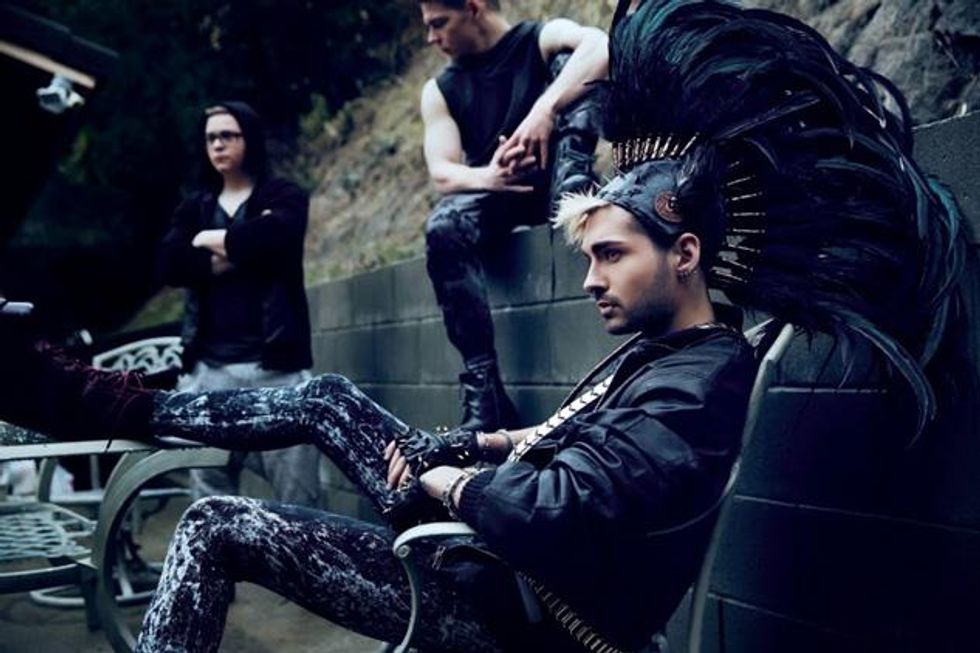
Long before the Viper Room became known as an iconic hangout of Hollywood's young elite as well as the site where actor River Phoenix died in 1993, 8852 Sunset Blvd. was a favorite hot spot -- then a jazz club called the Melody Room -- where mobsters like Bugsy Siegel and Mickey Cohen could frequently be found. It's a location deep-seated in the storied history of Los Angeles, and tonight, lead singer Bill Kaulitz and the other members of Tokio Hotel have set out to make a historic moment of their own as they prepare to perform for the first time on the same stage where acts ranging from the Pussycat Dolls to rock royalty like Tom Petty and the Heartbreakers have gone before. It's a vastly different setting than where they were just one week earlier, performing in Berlin before a crowd of nearly one million people, but as Kaulitz rounds out the group's sound check with a rapid-fire run of their track "Girl Got a Gun," it's apparent he's no less eager to perform for the 250 fans who are waiting on the other side of the nightclub's door to see one of Europe's biggest bands.
"We never really get to do these kinds of shows, so it's definitely different," he tells me moments later as we're led down the club's velvet-lined staircase to a dimly lit room beneath the stage. "But it's going to be fun because we're going to be so close to the people here tonight, and I always like that because [in a smaller venue like this] you get the energy you put out right back."
Though he says the band has been looking forward to performing in the famed West Hollywood nightclub for several days, he readily admits he and his identical twin brother, Tokio Hotel guitarist Tom Kaulitz, were in a completely different headspace a few years ago. After their debut album dropped in 2005, the band members quickly found themselves on a meteoric rise to fame, but four albums, hundreds of live performances around the world, and more than four years on the road had taken a toll on the 25-year-old artists. "After our last album came out in 2009, Tom and me left Europe and we moved to America, because it was just craziness," he says. "We just had to step away from the career a little bit, because we felt like we had said everything. We'd done so many albums over so many years and we'd been on the road for such a long time. We didn't know what to do or what kind of music we wanted to make."
Leaving their home in Germany, the twins moved to Los Angeles, where, Kaulitz says they "took a year off and didn't do anything" before finding new inspiration in L.A. nightlife. That muse resulted in a new electronic-laden sound for the alternative rock band, which they carefully crafted over the next five years as they began putting together their fifth studio album, Kings of Suburbia. The album was released worldwide last October and shot to the top of the charts in 30 countries, plus landing in the top 5 in 17 others to become Tokio Hotel's most successful album to date.
Kaulitz considers the album's success due to both the time the musicians spent honing their new sound as well as their willingness to take another risk. "We just wanted to make an album that we personally love," he says. "A lot of people don't do that, they make music for their fans. But this time I wanted to make an album that I'm totally happy with and that reflects my own style."
In addition to his distinctive sound, Kaulitz's sense of style has been one of the standout aspects of Tokio Hotel's onstage persona. This evening he's dressed in a pair of light gray jeans and a black graphic T-shirt with a black and white flannel long-sleeved shirt tied around his waist, a choice of attire that's a departure from the usual flamboyant fashions that have become synonymous with the singer. However, Kaulitz tells me his creative couture wasn't always appreciated. "When I was 13 I would come to school with makeup and nail polish and I had teachers who would say, 'We can't teach you and you're not allowed in class,'" he says as he runs his fingers through his bleached platinum-blond hair. "I got so much shit in school because I had an extreme look. There was always a lot of talking, but I always kind of enjoyed that. I like to play with it, because I find it funny that it upsets some people."
Kaulitz says his form of self-expression caused several raised eyebrows earlier in his career, with many people making assumptions about his sexuality. "When we first came out with our music, the gay question was always there and it was super important for everyone," he says. "But for me it was amusing. I was always laughing about it because I was like, 'Why is that so fucking important to everyone? Why can people not just live and do their thing?'"
He continues, "For me, love is such a beautiful thing and I love that you actually have no control over it. I never know what's going to happen. I never know who I'm going to meet when I walk outside. For me it's about finding the person you want to be with and I feel like it doesn't matter what gender that is. I don't understand why it matters so much to people. It's weird."
 It's this experience Kaulitz says that inspired the band to write the track "Love Who Loves You Back" that appears on their latest album, and informed the sexually fluid imagery that appears in the song's music video as well. "I wanted to show that love has no gender or boundaries. [The video] would've been stupid if I just had a pretty girl next to me or making out with a pretty girl the whole time. That wouldn't reflect the song," he says. "That's why in the video I wanted to have someone who is a little bigger, someone who is hairy, someone that's older, someone that's young. If there's a girl next to me, then of course there needs to be a guy next to me. Because that's for me what the song is about. In my opinion, love is not about gender, it's not about religion. Love has no borders and no boundaries. I feel like love -- you can't control it and that's a nice thing. It just happens and you don't choose who you fall in love with. That's why I love the song so much and that's why we shot the video the way we did."
It's this experience Kaulitz says that inspired the band to write the track "Love Who Loves You Back" that appears on their latest album, and informed the sexually fluid imagery that appears in the song's music video as well. "I wanted to show that love has no gender or boundaries. [The video] would've been stupid if I just had a pretty girl next to me or making out with a pretty girl the whole time. That wouldn't reflect the song," he says. "That's why in the video I wanted to have someone who is a little bigger, someone who is hairy, someone that's older, someone that's young. If there's a girl next to me, then of course there needs to be a guy next to me. Because that's for me what the song is about. In my opinion, love is not about gender, it's not about religion. Love has no borders and no boundaries. I feel like love -- you can't control it and that's a nice thing. It just happens and you don't choose who you fall in love with. That's why I love the song so much and that's why we shot the video the way we did."
The message is one Kaulitz says the band is excited to be promoting as they head out on their first world tour in five years, and he's looking forward to giving fans a show like they've never seen from Tokio Hotel before. "This time we're going to play clubs for a few shows and it's going to be a new experience for us because we usually play big shows all the time," he says excitedly. "Our fans will get to see us in a small environment this time and for this album it works out perfectly because we want to turn those clubs [where we play] into nightclubs. We want to take our fans to a party."
Watch the video for Tokio Hotel's "Love Who Loves You Back" below, and for tour dates and tickets for the bands current world tour, head to the official Tokio Hotel website.



 It's this experience Kaulitz says that inspired the band to write the track "Love Who Loves You Back" that appears on their latest album, and informed the sexually fluid imagery that appears in the song's music video as well. "I wanted to show that love has no gender or boundaries. [The video] would've been stupid if I just had a pretty girl next to me or making out with a pretty girl the whole time. That wouldn't reflect the song," he says. "That's why in the video I wanted to have someone who is a little bigger, someone who is hairy, someone that's older, someone that's young. If there's a girl next to me, then of course there needs to be a guy next to me. Because that's for me what the song is about. In my opinion, love is not about gender, it's not about religion. Love has no borders and no boundaries. I feel like love -- you can't control it and that's a nice thing. It just happens and you don't choose who you fall in love with. That's why I love the song so much and that's why we shot the video the way we did."
It's this experience Kaulitz says that inspired the band to write the track "Love Who Loves You Back" that appears on their latest album, and informed the sexually fluid imagery that appears in the song's music video as well. "I wanted to show that love has no gender or boundaries. [The video] would've been stupid if I just had a pretty girl next to me or making out with a pretty girl the whole time. That wouldn't reflect the song," he says. "That's why in the video I wanted to have someone who is a little bigger, someone who is hairy, someone that's older, someone that's young. If there's a girl next to me, then of course there needs to be a guy next to me. Because that's for me what the song is about. In my opinion, love is not about gender, it's not about religion. Love has no borders and no boundaries. I feel like love -- you can't control it and that's a nice thing. It just happens and you don't choose who you fall in love with. That's why I love the song so much and that's why we shot the video the way we did."

































































Charlie Kirk DID say stoning gay people was the 'perfect law' — and these other heinous quotes